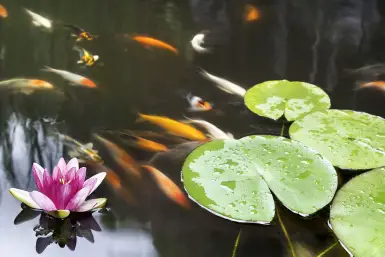
Browse Categories
- Dog Boot Camps
- Test
- Test
- Dogs Please Clicker Training
- Pet Insurance Comparison
- Exercising Pets With An E Scooter
- 10 Reasons Why Guinea Pigs Are Wholesome Little Pets
- Why You Should Use a Shed to House Your Pet
- How can Dog Owners Keep their Carpets Clean?
- How to Keep Your House in Order With Large Pets
- What is the Best Way to Feed a Puppy to Keep Them Healthy
- Pets Please
- All Animals and Pets
- Dogs and Puppies
- Cats and Kittens
- Birds
- Fish
- Reptiles
- All Other Small Pets
- Claws 'N' Paws Events
- PetsInLimbo/Greys4PetsInc.
News Search
PetsPlease News and Advice
Do You Want To Breed Your Koi Fish? How To Care For Your Baby Koi
If you have a Koi pond and have decided to breed them, the first thing you will need to do is get a spawning tank. It is much better to use a spawning tank instead of letting it occur naturally in the pond because to start with, you can keep the tank extremely clean, whereas the pond may not be.
It definitely depends on how big of a tank you are going to use as to how many Koi you can put in it, but for beginners, it is advised to put 3 or 4 Koi in the tank. All of this will help ensure you have healthy baby Koi to add to your pond! Be very aware that the spawning tank must have very clean water. It should also be warm, to be the right environment conducive for the eggs to fertilize.
You must have a good quality filtration system, to help keep the tank in top condition. Put some spawning ropes or brushes in the spawning tank, so the eggs can stick to them and this will also make it easy to move them into another tank, if need be.
You need to choose males that are not more than 2 or 3 years old and choose females that are from 3 to 5 years old. Using any younger or older Koi for breeding will most likely result in an inferior quality Koi.
Once the spawning process has been completed, put the adults back into the pond, or first you can put them in a recuperating tank, for a while. One reason for this is that Koi are well-known for eating their young, so you must NOT leave the spawning tank unattended for very long.
In about a week, the eggs will hatch, though this depends on the temperature of the water. The eggs could hatch in 4 days, if the water is a little warmer.
There are thousands of eggs produced during just one spawning, though only a fraction will survive to make baby Koi.
Once your baby Koi have hatched, you will not need to feed them for the first 2 days. After that, you can feed them at short, regular intervals. You will need to feed your baby Koi a packaged fry food and liquids that are rich in proteins, for around 4 weeks. You must keep the spawning tank extremely clean these first few weeks to keep any and all floating debris from getting caught in your baby Koi`s gills.
Once your baby Koi has reached at least 7.5cm in length, you can introduce them into the pond, but during this time, be sure to feed the babies a food that is small enough for them to eat, or they may starve!
These are very strong, sturdy fish, thanks to their ancestors, the carp and have become a very popular fish because they are a joy to watch and interact with, as well as being very beautiful. In Japan, these fish thrive in mud ponds in the fertile valleys, because of the rich mineral content in the mud. These minerals give an overall health to the Koi, plus it enhances their color!
You should feed your Koi foods that have Bentonite Clay, as it contains over 60 minerals that will help keep your Koi healthy and help your little baby Koi grow up in the best of health!
You can also add Bentonite Clay directly to the pond water and it will help stabilize the pH level of the water. When the water temperature reaches 24 degrees C., their metabolism is at it`s peak, so you will need to feed them a high protein diet at this time. During this period, you should feed your Koi at least 2 or 3 times a day.
It is also recommended NOT to settle for cheap quality Koi foods, just to save a few bucks, as a healthier, higher quality food means your Koi will have fewer outbreaks of any sicknesses. Purchasing your Koi can be very costly, so you wouldn`t want to stand the chance of losing your precious, pricy fish just because you wanted to save money by feeding them an inferior food!

